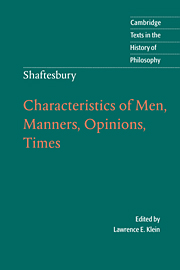Book contents
- Frontmatter
- Contents
- Acknowledgments
- Introduction
- Chronology
- Further reading
- Note on the text
- Characteristics of Men, Manners, Opinions, Times
- Preface
- A letter concerning enthusiasm to my Lord *****
- Sensus communis, an essay on the freedom of wit and humour in a letter to a friend
- Soliloquy, or advice to an author
- An inquiry concerning virtue or merit
- The moralists, a philosophical rhapsody, being a recital of certain conversations on natural and moral subjects
- Miscellaneous reflections on the preceding treatises and other critical subjects
- Index
- Cambridge Texts in the History of Philosophy
Soliloquy, or advice to an author
Published online by Cambridge University Press: 05 June 2012
- Frontmatter
- Contents
- Acknowledgments
- Introduction
- Chronology
- Further reading
- Note on the text
- Characteristics of Men, Manners, Opinions, Times
- Preface
- A letter concerning enthusiasm to my Lord *****
- Sensus communis, an essay on the freedom of wit and humour in a letter to a friend
- Soliloquy, or advice to an author
- An inquiry concerning virtue or merit
- The moralists, a philosophical rhapsody, being a recital of certain conversations on natural and moral subjects
- Miscellaneous reflections on the preceding treatises and other critical subjects
- Index
- Cambridge Texts in the History of Philosophy
Summary
No need to inquire outside yourself.
I have often thought how ill-natured a maxim it was, which, on many occasions, I have heard from people of good understanding, that, ‘as to what related to private conduct, no one was ever the better for advice’. But, upon further examination, I have resolved with myself that the maxim might be admitted without any violent prejudice to mankind. For, in the manner advice was generally given, there was no reason, I thought, to wonder it should be so ill received. Something there was which strangely inverted the case and made the giver to be the only gainer. For, by what I could observe in many occurrences of our lives, that which we called giving advice was, properly, taking an occasion to show our own wisdom at another's expense. On the other side, to be instructed, or to receive advice on the terms usually prescribed to us, was little better than tamely to afford another the occasion of raising himself a character from our defects.
In reality, however able or willing a man may be to advise, it is no easy matter to make advice a free gift. For, to make a gift free indeed, there must be nothing in it which takes from another to add to ourself. In all other respects, to give and to dispense is generosity and goodwill, but to bestow wisdom is to gain a mastery which cannot so easily be allowed us.
- Type
- Chapter
- Information
- Publisher: Cambridge University PressPrint publication year: 2000
- 2
- Cited by

